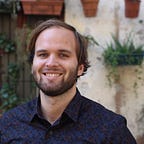“I don't know any good Ethereum developer that isn't a millionaire — There's a gold rush among developers to learn the coding language of money”
Says Aragon co-founder Luis Cuende that raised €25 million in 1.5 minutes in recent token sale.
We've all been watching the latest initial coin offerings (ICO's) the last months where startups has been raising hundreds of millions in Ethereum and Bitcoin, and parallelly the price of cryptocurrenciess has been sky-rocketing.
However, fewer of us really understand the opportunities blockchain technology represents.
I met with Luis Cuende co-founder of Aragon that recently raised €25 million in their token sale (ANT) to accelerate their mission which is:
Trying to build a more globalized world, where borders and intermediaries don't limit people, businesses or organizations.
Sounds great, but what does this really mean in the real world?
Luis says that Aragon right now first and foremost is a decentralized platform for transactions, and explains that they have three main groups of users that they know will start using the platform when it's live in Q4 this year:
The first people that will interact with Aragon is blockchain projects that will use the platform to govern their products, we already have many in line, waiting to start using it.
The second wave of users will be open-source projects, where people can contribute to open-source projects and pay/reward with tokens of the project to get governance over the product being built. Until now, monetization of open-source has been hard, we hope to change that.
He adds that the third wave will be distributed companies that can for example easily pay their employees in the Ethereum tokens.
No hype — no bubbles
Aragon is built on-top of Ethereum, and despite the incredible growth, he doesn't think Etheruem is expensive at all:
I thought it was expensive one year ago when it was at 13 dollars, but today when I see the possibilities created by the technology I think it's cheap. I believe Ethereum will be worth $1000 in a couple of years.
He explains he's most important reasons why cryptocurrencies aren't a bubble:
Compared to the world’s economy, crypto is a tiny drop in a lake, and this lake is a tiny drop in the ocean. The total market capitalization of crypto is $100 billion which is nothing in a macroeconomic perspective. Secondly, crypto hasn’t achieved its promises just yet. When it achieves 10% of what it promised to do, I can't even imagine how crazy that will be.
One ANT is currently worth 0,01 Ether, which is the equivalent of $2.5 dollars. When the network is up and running by late summer 2017, it will decide what the inflation rate will be.
Right now there's between 3–4000 individuals that own Aragon tokens.
Started with bureaucracy
As many startups do, Aragon originally pivoted from something completely different. Luis and his co-founder Jorge Izquierdo started a project to fight patent trolls, which is a huge problem for entrepreneurs:
But we hit a wall of bureaucracy when trying to fight these trolls. Then in the middle of all that Brexit happened together Trump becoming president.
It was our own little perfect storm. We wanted to unclutter organizations and networks of people and we came up with Aragon.
According to Luis, it’s not about erasing or solving public regulation, but finding a solution for people that want to escape bureaucracy, and believes through blockchain platforms like Aragon people can create more value, new businesses and be more efficient, than through traditional systems.
Influential investors
Aragon went through their token sale in mid-May. Luis says that ICO's shouldn’t be compared to an IPO, as they’re not selling shares to investors, but selling tokens, which is better compared to paid API keys, as Balaji S. Srinivasan brilliantly wrote on tokens.
However, one thing is people risking their personal money investing in these platforms, something else is VC's.
But the Aragon founders told their favourite investors, Boost VC, about the project and they loved it, according to Luis:
They really believed in Aragon, even before we had a real product, so they agreed to convert an investment into ANT tokens during the token sale.
Right now we have infinite runway, meaning we can have our 10+ team going for 100 years. At the time of our token sale, we were the 4th biggest crowdfunding in the world.
The Spanish founders sold 70 percent of all their tokens, the foundation Aragon owns 15 percent and the rest is distributed among the founders, advisors and employees.
But Aragon isn’t the first blockchain based company Luis started. Together with Tommasi Prennushi and Daniele Levi he co-founded Stampery, a blockchain identification tool to create legally binding proofs of documents, with famous VC’s onboard like Draper Associates, Blockchain Capital and Boost VC (again).
I talk with Brayton Williams at Boost all the time, they're super helpful and extremely insightful about blockchain technology.
Explosion in blockchain developers
A blockchain expert I talked to lately told me that there have been more people in space than there are really talented blockchain developers in the world.
Luis thinks there's even less:
I don't know any good Ethereum developer that isn't a millionaire, and it's only a matter of time before it will become a gold rush among developers to learn the technology.
After all, it's the programming language of money.
But according to Luis there's much more than money motivating today's blockchain developers:
There are so many exciting things happening in the blockchain community right now. One of the most interesting is someone building a stable coin pegged to global currencies, that will follow the dollar or the euro's value in the markets.
We're integrating these coins and this project into Aragon later this year, and that will hopefully remove the volatility question that crypto-currencies still suffers from.
They plan to employ 10–12 full-time team-members by the end of 2017, everyone working distributed (obviously..).
